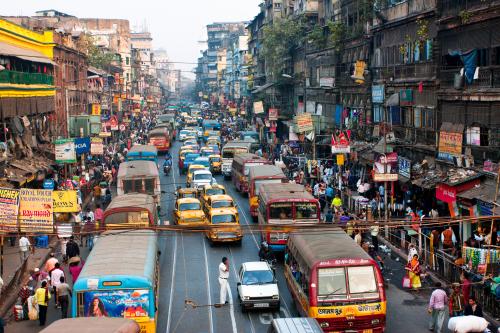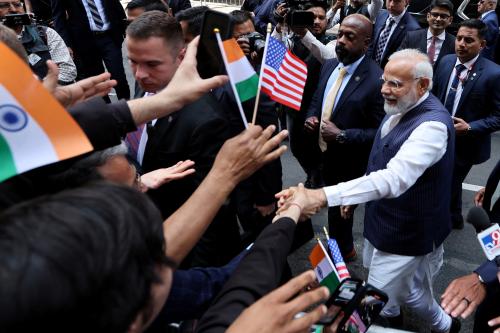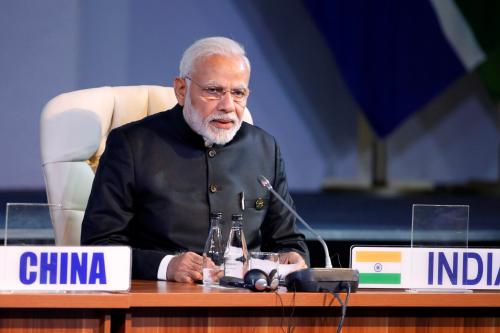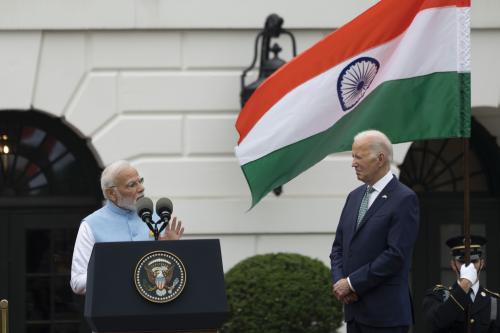This past weekend, India hosted its first G-20 summit, the annual gathering of leaders from the world’s largest economies. To assess highlights from the summit and India’s global role moving forward, Tanvi Madan, senior Fellow in Foreign Policy at Brookings, joins the program. Madan is host of the new Global India podcast, debuting this month from the Brookings Podcast Network.
TRANSCRIPT
[music]
DEWS: You’re listening to The Current, part of the Brookings Podcast Network. I’m Fred Dews. This past weekend, India hosted its first G-20 summit, the annual gathering of leaders from the world’s largest economies. To assess some of the highlights at the summit and India’s global role moving forward, I’m joined by Tanvi Madan, senior fellow in Foreign Policy at Brookings. Tanvi, welcome to The Current.
MADAN: Thanks, Fred. It’s good to be back.
DEWS: So what do you think India achieved or will achieve in the coming months by having hosted the G-20 summit?
MADAN: I think India achieved a few things from its perspective. First and foremost, it would be very relieved that it managed to get a joint communique out. There was some doubt in the lead up to the summit that the major powers who and the kind of emerging economies and the developing countries who are in the G20 could get to some consensus language, particularly on the Russian invasion of Ukraine and the Russia-Ukraine war.
They came up with a solution that won’t please everybody, but it is kind of the baseline consensus that they could agree to. There was some give and take involved, but nonetheless, India will be relieved that they got that joint communique out, which also helps kind of convey that the G-20 remains a relevant organization.
There was some concern that not getting a joint statement, particularly with Xi Jinping’s not showing up or Xi Jinping’s absence, that that would kind of convey the sense that this is an organization that is on its way out and failing. So I think for India, the fact that it got a hard negotiated, hard won joint statement, but this will also bolster the idea of India’s growing influence in the world, as well as kind of bolster its reputation as a, quote unquote, bridge between the developed world and the emerging economies in the developing world.
DEWS: I want to go back to that bridge concept in a minute. But first, back to President Xi Jinping. You just mentioned that he didn’t attend. Russian President Vladimir Putin also didn’t attend. Are those two absences significant?
MADAN: Xi Jinping and Vladimir Putin’s absence was significant in the sense that their presence might have created a very different mood in the G-20, in fact, might have been more divisive. What we saw was more emphasis on collaboration. But had they been there, I think you would have seen the divisiveness that exists outside in the geopolitical world would have spilled over into this economic forum. And when I mean kind of divisiveness, it’s not just competition between Russia and the West or the U.S. and China, but also India and China given their own rivalry.
So in some ways, the fact that Xi and Putin didn’t turn up gave India a more prominent role, made the G-20 perhaps more collaborative. But at the same time, you did see also President Biden take advantage and the West more broadly because of the absence of Chinese and Russian leaders, though not China and Russia as countries, absence of these prominent leaders gave the West and the so-called global South an opportunity to engage with each other. And so I think in that sense their absence actually, I think, changed the mood.
One thing I think there will be questions about which perhaps the fact that a joint statement was arrived at was what their absence means for the G-20 as an organization. And there’s some speculation about why Xi Jinping didn’t attend. Was it because of domestic concerns? Was it because of India-China tensions or was it because Xi Jinping is actually interested in creating an alternative world order or a China dominated organizations like Shanghai Cooperation Organization, like the BRICS, which just got expanded. And he will be hosting a Belt and Road forum in October.
DEWS: Well, you mentioned Joe Biden attended the summit, of course, and prior to the summit, he had pledged to deepen ties between the U.S. and India. Do you think he succeeded? And more broadly, how would you describe the state of India-U.S. relations now?
MADAN: I think the state of India-U.S. relations is excellent. It is deeper than and broader than it has ever been. It’s not that differences don’t exist. They do. But you really have seen with Prime Minister Modi’s state visit to the U.S. in June, with President Biden making it a point to support India’s presidency of the G-20, which was very important to not just the Modi government, but the Indian people. It was a sign that they sort of respect that the U.S. and other countries supported it. And I think this was particularly the case, given Xi Jinping’s absence, which was seen as a snub in India.
But President Biden also took the opportunity while he was in India of having another bilateral meeting with Prime Minister Modi, the idea being to put more runs on the board from the state visit, take some of the defense and technology initiatives, some of the economic initiatives, also clear some of the underbrush. The two sides announced, for example, that they have settled all their disputes, trade disputes at the World Trade Organization, but also announced some progress in terms of defense security technology initiatives that they had started during that June visit.
I think the idea partly was to keep the momentum going because next year both the U.S. and India go into an election year. And I think neither country is interested in that momentum flagging. So I think they wanted to keep kind of progress in the relationship going. And also in the lead up to what might be at some point next year, a quad summit with the Australian and Japanese leaders also joining.
So I think for the U.S.-India relationship, this was a good moment. You also saw not just a bilateral and President Biden supporting Prime Minister Modi’s G-20, but also the U.S. and India announcing a couple of other initiatives. One was a India-Middle East-Europe economic corridor that the U.S. is backing.
And second, you saw the Indian, Brazilian, and South African leaders meet with President Biden. This is a grouping called the IBSA, which is the democracies in the original BRICS countries. But they also happen to be the countries who are the current and the next two chairs of the of the G-20.
One thing that was interesting that you saw with Biden-Modi interactions is that along with the bilateral meeting that they had, it was clear that the two sides had coordinated in the lead up and perhaps in the last year or so about some issues. And you saw some, a couple of key themes that did come up. And I think, you know, the key one that I would mention is reformed multilateralism. And you saw, for instance, India and the U.S. leading the drive for reinvestment in the multilateral development banks. And they didn’t mention why by kind of name, but it’s essentially to make the argument that to countries that you don’t need to turn to China for Belt and Road initiative financing that might not be on very good terms and might lead to debt burdens that you can’t handle. But we can offer through the World Bank, through other international financial institutions, alternatives that are better solutions and more sustainable solutions for you as developing countries.
You also saw, while they talked about reform multilateralism, kind of “minilateralism” also come up through this India-Middle East-Europe economic corridor that the U.S. is supporting as well. And so you saw these two aspects, reformed multilateralism and minilateralism, while also seeing that what we’re seeing in this G-20 or with the U.S.-India relationship is not deglobalization, but a different kind of globalization that India and the U.S. have bought into too.
DEWS: There are so many acronyms to keep in mind here. You mentioned that one just now IBSA, but BRICS more broadly, Brazil, Russia, India, China, South Africa. Within that context, but also within the G-20, what are India’s ambitions in terms of its regional and global economic position?
MADAN: I think India seeks to engage with the world economically in a couple of different ways. One, I think, India understands that all this kind of hosting of summits, its attention it’s getting from the world, it is dependent on the fact not just that India has one of the largest militaries in the world, but essentially by the fact that it is growing at a pace that others aren’t. It’s one of the fastest growing major economies in the world today. And this is particularly in contrast to China’s economic headwinds.
And so India, I think, recognizes that at the end of the day, you need economic power not just for influence and for a role in the world, but also to power even that military power that I mentioned. And it makes India an attractive partner for other countries, and therefore, they will be willing to work with India.
I think the second aspect is that India recognizes that it cannot grow without engaging internationally. Insularity is not going to lead to India becoming a major economic power, which it needs to be. And so it’s it is engaging.
And I think the third aspect of that engagement has been you see an India that is trying to both diversify or de-risk its own dependance on China, but also take advantage of other countries like the U.S., like in Europe, like Japan, like even Australia, as they try to de-risk their economies from China. India is trying to make the case that they can be the answer. They can be that one in the China plus one strategies as countries are seeking to diversify and companies are seeking to diversify where they’re manufacturing and where they’re taking their business, for that matter.
Having said that, on the economic side, there are still some constraints. You hear businesses talk about some uncertainties in the business environment in India, but overall they’ve been rather positive about India recently.
DEWS: So back to this issue of the Global South that you mentioned at the top of this discussion. We’ve seen China and to some extent Russia seeking influence throughout that region of the world, sometimes as a counter to the U.S. You mentioned China’s Belt and Road Initiative, for example. How does India fit into this particular construct, especially as it relates to rivalry amongst the U.S., China, and Russia?
MADAN: India is an interesting kind of actor in this dynamic because on the one hand, it’s somewhere between a G-7 and what used to be called the G-77 countries, which is what is essentially constituting in many people’s minds the Global South today. So on the one hand, it is very much part of the global South itself, and it faces many of the same developing country issues that other countries in that category do.
Also highlighting as it did at the G-20, you know, the challenges that these countries are facing, like climate change, like health security, like debt relief. And so you see an India that is part of the Global South
But it’s also a country that like China, like the U.S., like Russia is competing for influence with and in the Global South. And so you see India describing itself as a voice of the Global South and also arguing behind the scenes often to its Western partners that don’t see this as us being a barrier between the West and the Global South. We can be that bridge.
And for India, that’s also useful because that makes India in some ways increases India’s utility for its partners in the West. So at the at the same time, it is a Global South country, it’s also competing for influence among those countries and competing in this case with China for that influence.
DEWS: Well, Tanvi, as we conclude here, I’m excited to announce to our listeners that you are the host of a new podcast coming out and, disclosure, I’m one of the producers on that. Can you tell our listeners more about that new show?
MADAN: Fred as you know, I’m very excited about the new podcast. It’s called Global India, and it comes from the fact that we’ve seen increasing interest in India these days around the world and questions that come up about Indian foreign policy or India’s economic engagement with other countries. You have questions like are India and China going to be friends, or questions like how is India is going to go? How was India going to react to the Russian invasion of Ukraine?
And what we seek to do is to explain Indian foreign policy with a series of guests who will talk about how India sees various countries or issues, how it approaches them, and what the implications are for the rest of the world, particularly major powers like China, like the United States, like Europe.
And what we’re going to do is start the first season with a series of episodes on the India-China relationship, because that relationship is the prism through which Indian policymakers are seeing a number of other issues and a number of other countries as well. So we’re very much looking forward to it. And I hope your listeners tune in to that podcast, too.
[music]
DEWS: Excellent. It’s a very exciting new show. We’re very much looking forward to publishing it. It will be available both on YouTube and on the normal podcasting channels. Listeners can find out more about it now on our website, Brookings dot edu slash Global India.
Tanvi, thanks again for taking the time today to talk with us about India post-G-20 Summit.
MADAN: Thanks very much, Fred.







Commentary
PodcastIndia in the world after the G-20 summit
September 12, 2023